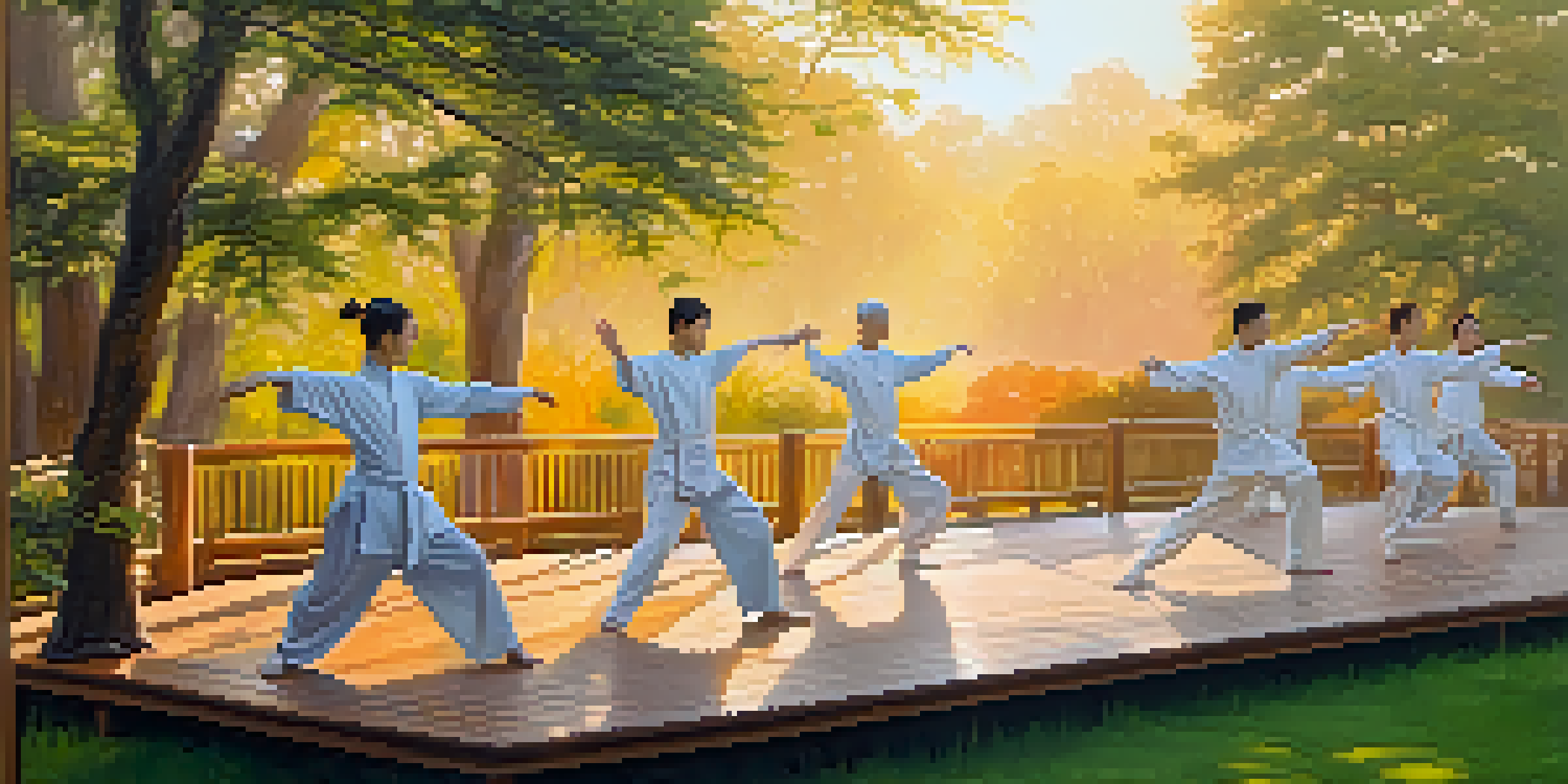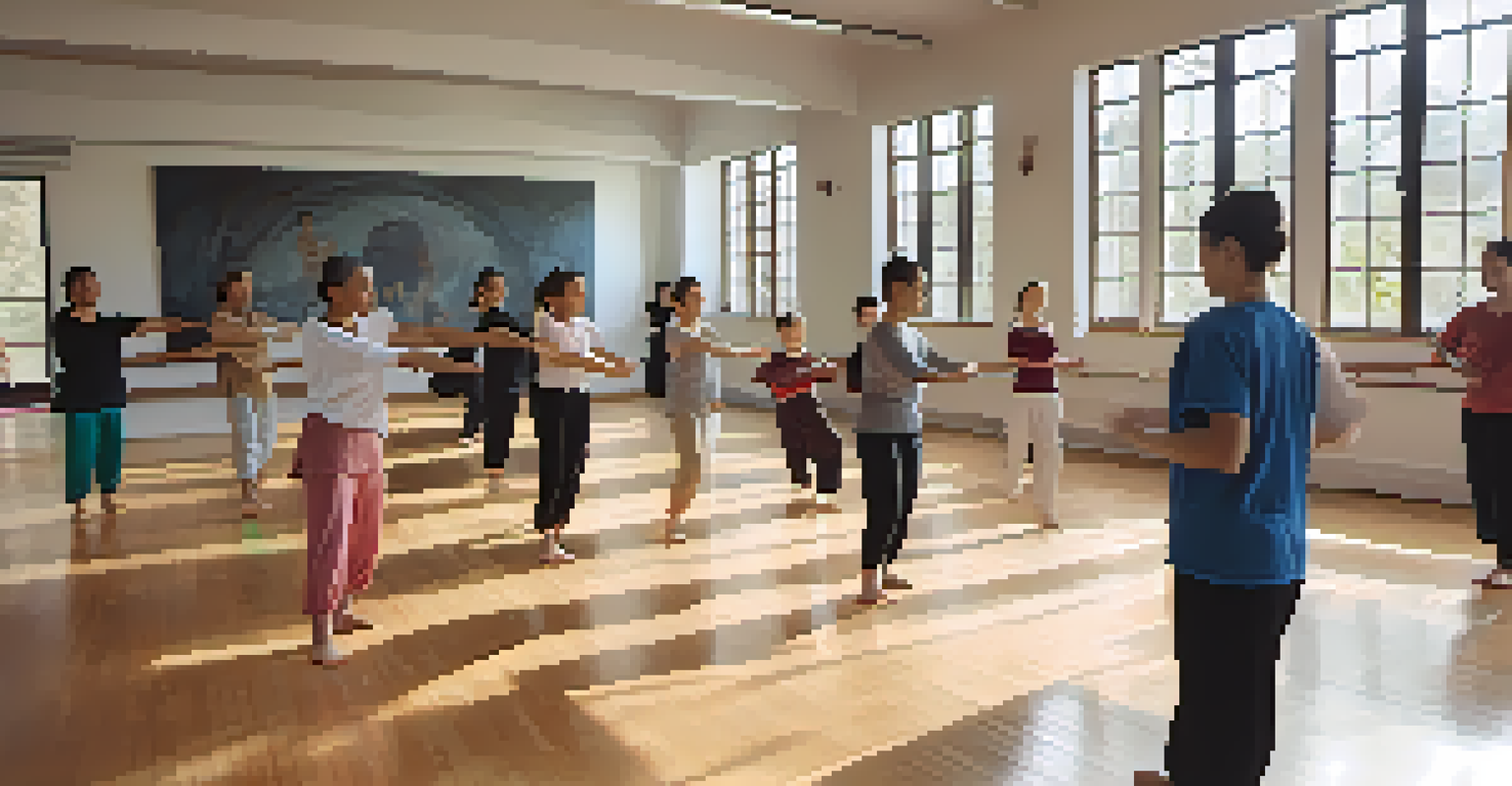Tai Chi: Finding Balance Between Body and Mind in Practice

Understanding Tai Chi: A Journey of Balance
Tai Chi, often referred to as 'meditation in motion,' is an ancient Chinese martial art that emphasizes gentle movements and deep breathing. It is designed to promote serenity and balance, making it more than just a physical exercise. Practitioners often find that it nurtures both the body and the mind, creating a holistic experience.
Tai Chi is a way of being, a way of living, a meditation in motion.
The beauty of Tai Chi lies in its fluidity, where each movement flows into the next, much like a serene river. This graceful practice helps to cultivate a sense of inner calm, allowing participants to focus on the present moment. As you learn the movements, you gradually discover how to connect with your body and mind on a deeper level.
Whether you're a beginner or have been practicing for years, Tai Chi encourages you to embrace the journey rather than focus solely on the destination. It's about finding your own rhythm, which can lead to a profound sense of well-being.
The Physical Benefits of Tai Chi Practice
Engaging in Tai Chi can significantly enhance your physical health. It promotes flexibility, strength, and balance, helping to improve overall mobility. Many practitioners find that regular practice can reduce the risk of falls, especially in older adults, as they become more aware of their body movements.

Beyond flexibility and strength, Tai Chi is a low-impact exercise that minimizes stress on the joints. This makes it accessible to people of all ages and fitness levels. Imagine a dance that doesn’t strain but rather revitalizes your body, providing a refreshing way to stay active.
Holistic Benefits of Tai Chi
Tai Chi promotes physical health, mental clarity, and emotional resilience, creating a balanced experience for practitioners.
Moreover, the slow and deliberate movements encourage better posture and alignment, which can alleviate chronic pain. As you practice, you may notice improvements in your physical condition, leading to a more active and fulfilling lifestyle.
Mental Clarity: The Mind-Body Connection
Tai Chi is not just about physical movement; it also fosters mental clarity and focus. The practice encourages mindfulness, a state where you become fully aware of your thoughts and feelings without judgment. This mental engagement can help reduce anxiety and improve overall emotional well-being.
In Tai Chi, we learn to move with grace, balance, and an awareness that transforms our experience of life.
As you synchronize your breath with movement, you cultivate a sense of peace that transcends the physical realm. It’s like clearing out the clutter from your mind, allowing for greater clarity and insight. Many find that Tai Chi becomes a moving meditation, where the distractions of daily life fade away.
With consistent practice, you may discover enhanced concentration and decision-making abilities. This mental sharpness can spill over into other aspects of your life, helping you tackle challenges with a calm and focused mindset.
Emotional Resilience Through Tai Chi
One of the most profound benefits of Tai Chi is its ability to foster emotional resilience. Through its meditative movements, practitioners often find a release from emotional tension, leading to a greater sense of calm and stability. This emotional balance can help individuals navigate life's ups and downs with grace.
Imagine Tai Chi as a gentle wave that washes away stress and anxiety, leaving you refreshed and centered. As you engage in the practice, you learn to respond to challenges rather than react impulsively. This cultivation of patience and understanding can transform how you approach daily situations.
Accessibility for All Ages
The low-impact nature of Tai Chi makes it suitable for individuals of all ages and fitness levels, enhancing flexibility and strength.
Furthermore, Tai Chi creates a supportive community as many practitioners gather in groups. This sense of belonging can enhance emotional well-being, providing a network of encouragement and shared experiences.
Integrating Tai Chi Into Your Daily Routine
Incorporating Tai Chi into your daily life doesn't require a complete overhaul of your schedule. Start with just a few minutes each day, focusing on specific movements or breathing techniques. This gradual approach allows you to ease into the practice without feeling overwhelmed.
Consider setting aside a designated time each day, perhaps in the morning to start your day with intention or in the evening to unwind. Just as you might enjoy a cup of tea, think of Tai Chi as a moment to savor, creating space for relaxation and mindfulness.
As you become more comfortable, you can explore longer sessions or join a class to deepen your practice. Remember, it’s about progress, not perfection; each movement takes you one step closer to achieving balance.
Finding Community Through Tai Chi Classes
Joining a Tai Chi class can enhance your experience and provide a sense of community. Local classes often welcome individuals of all skill levels, fostering an inclusive environment where participants can learn from each other. This shared commitment to practice makes Tai Chi not just a workout, but a social activity.
In a group setting, you can also benefit from the guidance of experienced instructors. They can help you refine your technique, ensuring that you are practicing safely and effectively. It’s much like having a coach who encourages you to reach your potential while enjoying the journey together.
Community and Support in Classes
Joining a Tai Chi class fosters a sense of community, providing motivation and guidance while enriching the practice.
Moreover, being part of a community can keep you motivated and accountable. The friendships formed through Tai Chi can enrich your practice, making it a memorable and enjoyable part of your life.
Conclusion: Embracing the Art of Tai Chi
Embracing Tai Chi is about more than just learning movements; it’s about cultivating balance in every aspect of your life. This ancient practice teaches us the importance of harmony between body and mind, providing tools for stress management and emotional resilience. As you explore Tai Chi, you may find that it becomes a cherished part of your daily routine.
The journey of Tai Chi is personal and unique to each individual. Whether you seek physical fitness, mental clarity, or emotional balance, this practice offers something for everyone. Just as each movement connects to the next, so too does your journey connect to your growth and well-being.

So, why not take that first step today? Whether you practice alone or in a group, the benefits of Tai Chi await you. Find a class, watch a video, or simply step outside and breathe deeply—your path to balance and tranquility begins now.